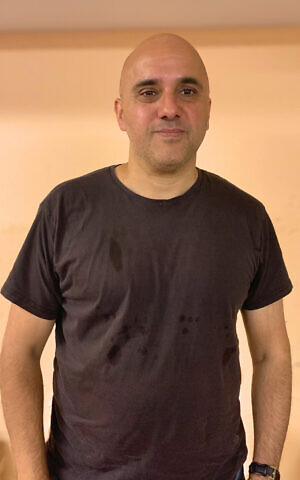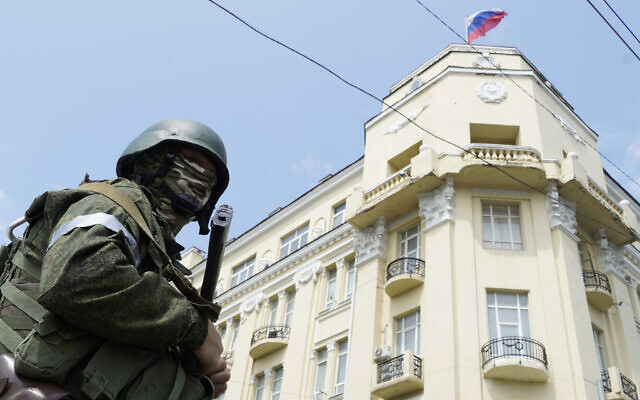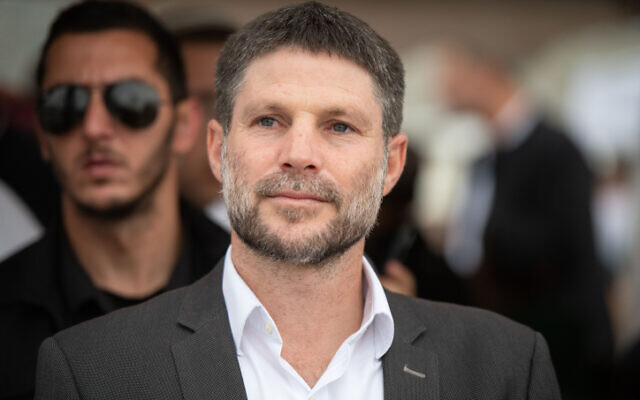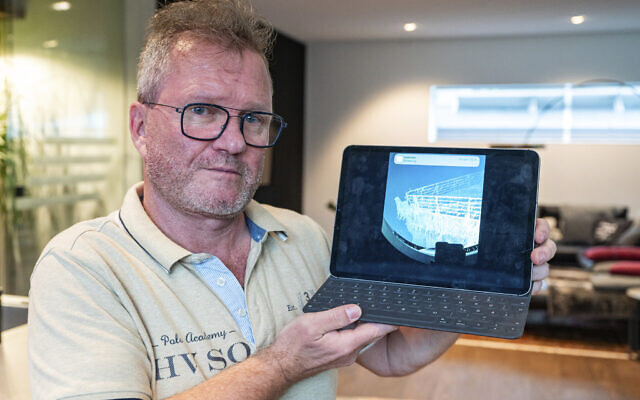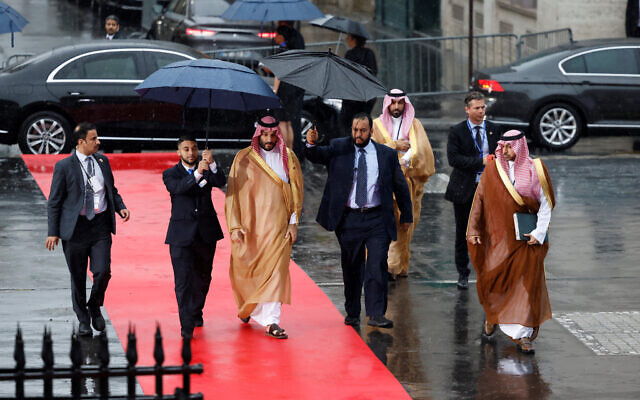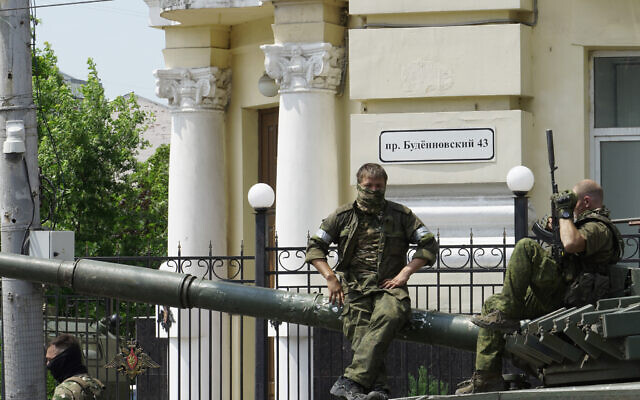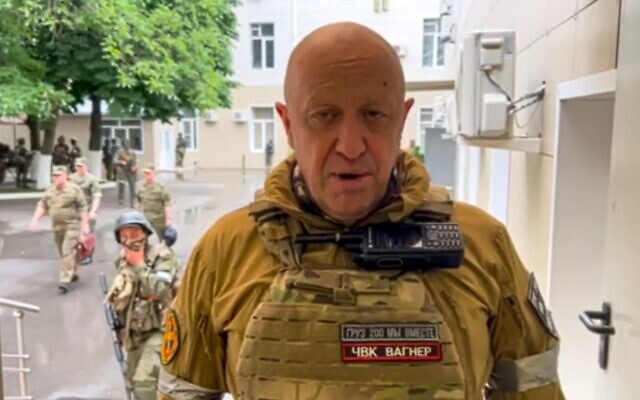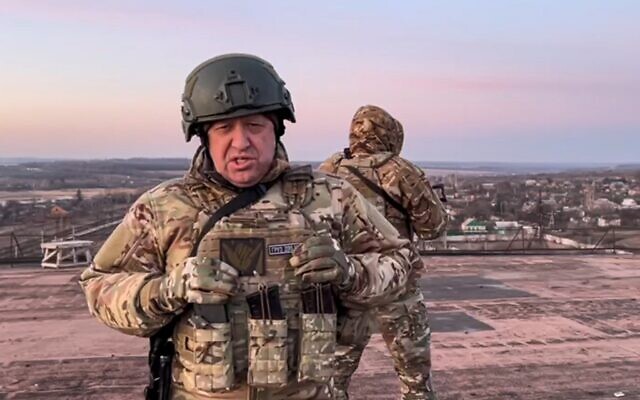What Matters Now to Jonathan Spyer: Iran’s confrontations with its enemies
New alliances thread through Mideast as Syria is re-embraced by the Arab League and Iran signs accords with Saudi Arabia, UAE. This week, we hear of additional looming hotspots
Welcome to What Matters Now, a weekly podcast exploration into one key issue shaping Israel and the Jewish world — right now.
Eleven years ago, Prime Minister Benjamin Netanyahu delivered his much-quoted “Iranian nuclear duck” speech at AIPAC warning against United States plans for a nuclear deal. Fast forward to today and we hear reports that the United States is now looking for a “less for less” deal to stave off that Iranian duck’s final launch.
This week alone, Iran made international headlines as it claimed it had developed a hypersonic missile capable of traveling at 15 times the speed of sound. We were likewise told that Iran will head a naval alliance in cooperation with other Gulf states. And we heard that Iran is set to reopen its embassy in Saudi Arabia.
There are new truces in the region and a re-embrace of Syria in the Arab League. And that’s just the beginning.
This week, Dr. Jonathan Spyer, the director of research at the Middle East Forum and editor of Middle East Quarterly, gives us a whirlwind tour of the new alliances threading through a tangled region.
A freelance security analyst for Janes Information Group and a columnist at The Jerusalem Post, Spyer is also an on-the-ground journalist who has entered Syria, Lebanon and Iraq numerous times and is the author of the 2018 book “Days of the Fall: A Reporter’s Journey in the Syria and Iraq Wars.”
And so this week of increased news out of Iran, we ask Jonathan Spyer what matters now.
The following transcript has been lightly edited.
The Times of Israel: Jonathan, thank you so much for joining me here today in Jerusalem’s Nomi Studios.
Dr. Jonathan Spyer: Thank you very much for inviting me, Amanda. Very nice to be here.
It’s a visit that I’ve been planning for a long time, actually, with you. Because there’s so much happening in the region, I feel like the chessboard is shifting, if not daily, at least weekly. We have Syria reentering the Arab League. We have Saudi Arabia and Iran all of a sudden friends again. Maybe we have the UAE and Iran also kind of friends. And now there’s talk of this new joint Navy. So I ask you, Jonathan, in this period of time in which so much is happening every single day, what matters now?
To me, what matters now pretty much all comes under the Iran file heading. I would say a very interesting article in The Washington Post a couple of days ago, revealing information regarding plans by the Iranians in cooperation with the Syrian regime to carry out attacks on US forces inside Syria. There’s been an uptick in attacks coming at US forces in Syria from Iraq in recent months. Very significant, in my opinion. And together with that, the ongoing maritime contest between Iranian attempts at harassing shipping coming through the Straits of Hormuz, and the attempt by the United States and allied Navies to prevent that. It’s all pretty much under the same heading of a heating up, I would say, of Iran’s confrontation with its enemies in the region.
Right, so if Iran is on one side of the chessboard, if we can call it that, who is on the other side, at this point?
That’s the key question, in a way, because whereas we used to be keen on certainly in this country, keen on sort of positing the emergence of a crystallizing counter-Iran alliance in which the Abraham Accords, obviously, of August 2020 played a starring role, where supposedly, there was a coming together of a number of countries who had the joint interest of being threatened by Iran — Israel, United Arab Emirates, hopefully, in the near future, Saudi Arabia, Bahrain.
And now, I think because of events of recent weeks and months, we have to very seriously qualify, or caveat, that quite optimistic picture. Because actually, as it now seems, certainly from the vantage point of at least where I’m sitting here in Israel, there is an attempt by the Gulf Arab states to kind of hedge their bets between Israel and Iran or between the US and Iran. I think with the clear intention of staying out of any future confrontation between Israel/US and Iran. And together with that, there is also growing evidence of a desire on the part of the United States administration, before the elections in 2024, to reach some kind of diplomatic achievement on the Iran nuclear file, whereby a kind of less-for-less partial deal would be carried out, with the Iranians receiving sanctions relief and money, in return for keeping their enrichment to the current 60%.
All of that is counter to Israel’s desires and interests, which means that if all that goes ahead, then, kind of unfortunately, what we have is an emergent picture in which Israel will find itself increasingly alone against Iran. Now, Israel has many, many capabilities of its own, so that’s not a reason to hit the panic button. But that is, I think, an emergent and very interesting and significant reality.
So, this is quite the tangled knot that you’re weaving right now, and I just want to pick out some of the strings to begin with. First of all, the re-embrace of Syria just had my eyebrows way up into my hairline because we’re talking about a dictator who killed half a million of his own countrymen. We’re talking about six million refugees from his country. We’re talking about horrible poison gas attacks on them. And now he’s again part of the Arab League. But does that mean that, essentially, Iran is part of the Arab League?
Well, I do think that, yes, the return of Syria to the Arab mainstream and obviously the recent welcoming of President Bashar Assad, as we must now, I guess, begin to get used to calling him again, at the Arab League summit in Jeddah in Saudi Arabia, is evidence of a general rejigging of the situation. And I do think the return of Syria is downstream from the return of Iran to normal diplomatic relations with UAE and with Saudi Arabia. The return of Syria happens downstream from that. That’s to say, it’s hard to imagine it happening without that happening beforehand because Assad’s Syria is an integral element of the Iran-led regional alliance.
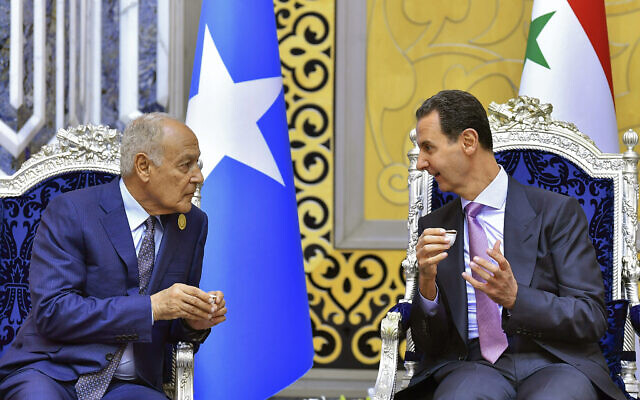
Now, that analysis of mine comes contrary to the view of some of my colleagues who would say, no, this is, on the contrary, an example of the beginning of Syria’s distancing itself from Iran. I think that’s wildly overblown and optimistic. I think what’s happened so far is that the Iranians and their allies have received all kinds of free gifts from the Gulf Arabs and others, reputedly their adversaries. And in return, at least so far, they have given nothing.
A recent statement by Tim Lenderking, the US envoy on Yemen, for example, quoted in The Wall Street Journal had him saying: “Up until now at least, we see no change whatsoever in the provision of arms by the Iranians to the Houthis in Yemen.” Now, I seem to remember that that was supposed to be the main concession everybody was hoping that Iran would make in return for the return of Iranian-Saudi diplomatic relations. It ain’t happening yet. And if anybody thinks that Bashar Assad is going to begin to distance himself from the Iranians in return for his return to the Arab League, well, there’s no evidence of that of any kind whatsoever.
So I wouldn’t exactly say it’s Iran joining the Arab League, but it may well be Iran demonstrating the hollowness of the Arab League, and demonstrating that Iran and its allies right now are the people with the advantage and the initiative in terms of the regional diplomatic and strategic situation.
So what does that mean? As you said, it says that Iran is flexing, essentially. And so does that mean that in terms of our region, Iran is the player right now?
Well, I wouldn’t say Iran is the player in the sense that we’re focusing on areas in which the Iranians have the advantage. And there are areas in which they do. They have proven remarkably adept at operating in the kind of fragmented and partially collapsed spaces that have emerged in the Middle East over the last decade or decade and a half, whether that’s Syria or Iraq or Lebanon or Yemen, or arguably even the Palestinian Territories. They have a kind of methodology and praxis of irregular warfare and irregular political activity, and combining the two, which has produced very, very serious and significant results in their favor over the last decade and a half.
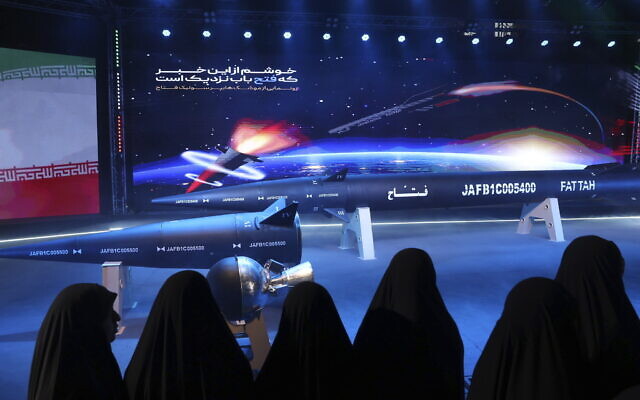
Now, that isn’t the entirety of the region. That isn’t the entirety of what politics and power is. When it comes to economic power, they are, of course, vastly outstripped by the Gulf Arabs. And we see the way in which, while the Iranians try to get close to the Chinese, actually the Chinese are much more interested in relations with Saudi Arabia, for example, because there’s much more potential gain in it for them. And when it comes to conventional military activity, we see the way in which Iran has no effective response to Israel’s bombing campaign over the skies of Syria, of the last, now, seven or eight years standing. They simply have no way to respond to that. So when it comes to most of the gauges of conventional political and military activity, it is Iran’s adversaries that have the advantage.
But what Iran has proven very much able to do is to kind of play a weak hand very well indeed, and to turn their weaknesses into strengths. Think of what’s happening in the Strait of Hormuz in recent days as an example. The Iranians, of course, can’t stand up against the United States 5th Fleet and the United States Navy. But what they can do is they can turn their limited abilities into an advantage by developing a kind of maritime terrorism, if you can call it that way, based on the aggressive use of fast attack boats to harass civilian oil tankers and other ships passing through the strait. So it’s an example of that they have a way of turning weakness into strength, which delivers quite a lot for them in terms of the realities on the ground.
Okay, so the sea is one area in which they’re using this terrorism. My center of gravity is, of course, Israel. So let’s talk about our northern border and Syria and Lebanon. And you, unlike many, many Israelis or people based here at least, have been there. So when was the last time you were there?
Well, the last time I was in Syria was a while ago and I was in November 2019, just prior to the pandemic. The last time I was in the Syrian border area in northern Iraq was, in fact, November of last year. So it was a few months ago.
So, is the country just a rubble, as we’re hearing in the news? What is happening there?
Yeah, Syria is. I mean, I managed to visit, one of my sort of many visits, to Syria during the period of civil war and I managed to visit Damascus and the area. The last time was in April 2017. And when I came back from there, I didn’t sort of have any huge scoops in terms of discovering something factual, material on the ground. But I did come back with a very strong sense, which I then wrote about at that time for Foreign Policy magazine, which was that Syria had effectively ceased to exist. That’s what I called the article.
In other words, that Syria was in a state of de facto partition, of ongoing frozen conflict, of facing enormous destruction of infrastructure, and that that added up to a country that had effectively ceased to function as a country. We’re now six years on from that. I was kind of accused at the time by some colleagues of having a somewhat simplistic view and actually underneath the stuff that I hadn’t seen, this immensely strong Syrian state. Well, maybe. We’re now six years on from that and I personally find no reason to radically revise that impression and that analysis.
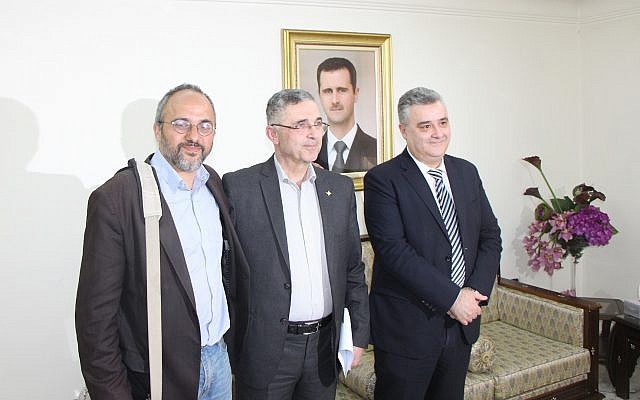
Syria remains divided, as is well known, and is in a situation where the regime only controls between 60-70% of the country. The Kurds and their US allies control an additional 30%, and then the Turks and their jihadi and Islamist allies control the remaining 10%. But even within those areas of control, and this is maybe the crucial point, within the regime’s so-called area of control, the people really controlling the whip hand, so to speak, is not the Assad regime and Bashar Assad, but it’s the Iranians on the one hand and the Russians on the other.
So, Syria today is a country thoroughly penetrated by outside powers, both regional and global. It is the arena for those powers to play out their own rivalries, without concern or request of the Syrian people. It remains enormously destroyed in terms of infrastructure, with no real prospects for major reconstruction at the present time as long as American and European sanctions continue on the country. So yes, Syria is indeed a pile of smoking rubble, unfortunately, and tragically for its people. And right now at least, it doesn’t seem like that’s going to be changing anytime very soon.
And add to that, of course, the boon in drugs, in the drug industry being created.
Well, absolutely. Syria, the regime at least, has now emerged as maybe the region’s first narco-state. Frankly, the estimate is that Syria, Assad’s Syria, in cooperation, by the way, with Lebanese Hezbollah as a key partner in this, is now responsible for, I think the figure given is 80% of the world’s captagon trade. It’s a deeply addictive drug, which is making its way down via Jordan down into the Gulf. And this has proven to be a remarkably useful tool for the regime, not only economically, by the way, but I think also diplomatically.
That’s to say, I think it’s a fair assessment to make that one of the reasons why Saudi Arabia and UAE were so keen to renew relations with the Assad regime, was because they thought that would be a way in which they could then request that Assad begin to change, to affect the flow of captagon down into the Gulf.
So this is an example of, not only of a regime using narcotics to provide revenue for itself, but also leveraging narcotics as a kind of diplomatic tool of pressure. It’s all very bad stuff, and it’s really not what you want to be happening in the neighborhood in which you are a resident. But that’s the situation. So, yes, Syria and Lebanese Hezbollah — Lebanese Hezbollah, of course, has long made use of the international trade in narcotics as a source of revenue, and this is well-documented. And today, Assad, Syria has joined it as a very, very major partner in that enterprise.
Talk about the Hamas units that are now in Lebanon, as well.
Yeah, well, I think this is very significant. I mean, you’ll remember that in April there was this volley of 34 rockets and missiles fired from southern Lebanon, in the direction of Israel. And at the time, at least, we were told that — the initial kind of assessment given, or at least message given by the Israeli system was that this appeared to have been carried out without the knowledge of Hezbollah. And that was something which kind of caused many of us to kind of raise an eyebrow because it just didn’t seem very feasible.
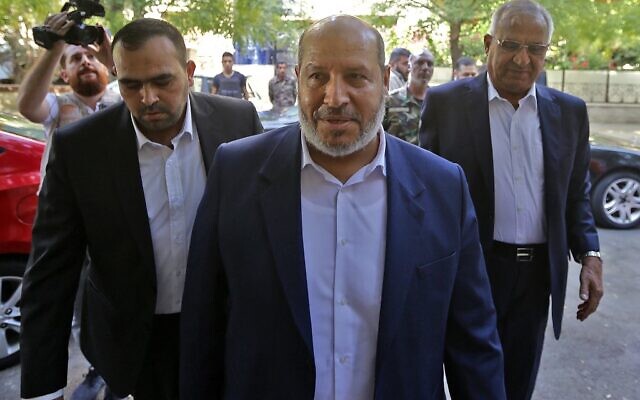
I’m somebody who spent a little bit of time in south Lebanon, not only as a soldier, I’ve also spent time there as a soldier, but also as a journalist, traveling around that area. And it really is, without exaggeration, one of the most locked-down areas on the planet, at least, which I’ve experienced. Hezbollah, even the visible presence of Hezbollah’s infrastructure is everywhere south of the Litani. And that’s without mentioning the invisible structure, no less potent, which is surely surrounding that. So the notion that anybody could kind of get in there and fire, not one stray rocket, which is maybe just about credible, but a whole salvo of rockets and missiles without anybody knowing who they are, and without the permission of the Hezbollah power in the area, is simply not serious.
As far as I’m aware, the system has kind of walked that back, that initial assessment, back in recent weeks or subsequent weeks. I think we can conclude that this was Hamas, and if it was Hamas, it was Hamas operating with the permission of Hezbollah. And this is very significant indeed, because one of the most famous or popular slogans of Hezbollah, and its leaders and its mouthpieces and other mouthpieces of the Iran-led regional bloc is the notion of the “unification of the fronts,” or “unification of the arenas,” which is meant to mean that rather than one or other element of the so-called resistance axis operating against Israel at any given time, rather, they will coordinate their activities, so that action in Jerusalem will lead to reaction from Gaza, as we saw, for example, in the Ramadan of 2021. Or as we’ve just seen in April, action against Islamic Jihad in Gaza will lead to action coming from Hamas out of Southern Lebanon.
So these were evidence that that long-standing slogan was starting to be put into practice, in quite a worrying way. If we think of the Megiddo incident also in March, where a terrorist came down from Hezbollah-controlled south Lebanon carrying an IED, a weapon not usually seen in the West Bank, with the intention of carrying out a major attack, was neutralized before he could do so. But the fact that Hezbollah had clearly either dispatched him, or allowed him to be dispatched from southern Lebanon, was very significant indeed.
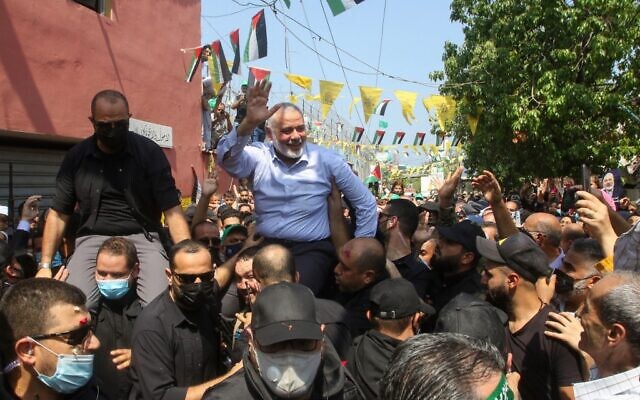
There’s a sense in which there is a growing mood of confidence on the part of the Iran-led regional bloc, and it was a growing mood, of course, of misplaced confidence. They were looking at the demonstrations in Israel, and by the way, lots and lots of media coverage in pro-Iran media about the demonstrations in Israel. All of which not seeing it as what it actually was, at least in my opinion, an example of the strength of Israeli civil society, but rather seeing it as evidence of Israel’s artificiality and fragility and weakness, putting that together with the growing confidence of some of the fighters in the northern West Bank and other indications, and the sense they may well be heading towards a fall because they may well be heading towards testing Israel’s resolution and strength. And Israel is, of course, much stronger than they are, even in the combination of them.
But Israel does not want to have to prove that. Israel would prefer to maintain deterrence. And there was a sense that deterrence was getting dangerously thin and that we were heading towards some form of testing of strength. I would say we’re to some degree still in that mode, even though we managed to get through Ramadan this year without any major flare-ups, I think we’re still to some degree in that mode. And I think also Israel’s pattern of activity in a number of arenas confirms that.
Even in the past several days we’ve heard voices out of Iran saying, yes, we will continue to see Israel as the major threat. But I’ve never understood why.
Well, I think that if we look at Iran’s regional strategy, we can see a kind of combination of sort of geostrategic ambitions, and also ideological and religious motivations. And I think to some degree, Israel plays a part in both of those. When it comes to geostrategic ambitions, as is well known, the Iranians want to reach the Mediterranean Sea, as indeed Persian empires have been trying to do since antiquity. They want to replace the United States as the security guarantor in the Gulf. Again, a clear sort of geostrategic goal. And those elements add up to a desire to replace the United States, overall, as the hegemon in the region.
The Iranians have an instrumental use for their hatred of Israel because what they think is that via that they can mobilize the masses of the Arab publics behind them. I think they have a very simplistic and maybe slightly outdated view, by the way, of the Arab publics, who I think by and large today are maybe much less motivated by, and galvanized by the Palestinian cause than was once the case. But I think the Iranians still believe that. And they believe that the Palestinian cause can kind of cancel out the Iranian essential foreignness in the region to the power too. Given that they are both Shia Muslims and that they are, of course, non-Arabs. They believe that can cancel that out. So I think that’s the kind of pragmatic or instrumental element of the focus on Israel.
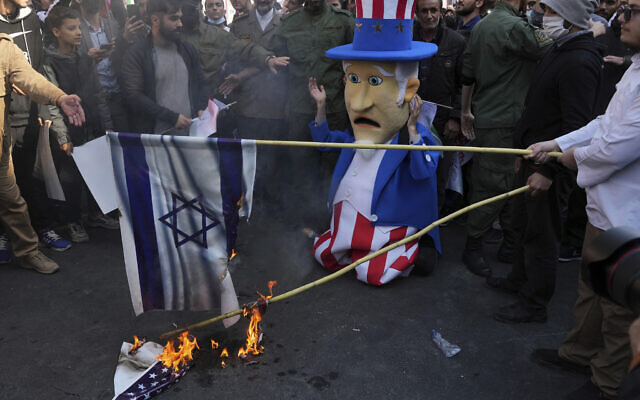
But I think we shouldn’t forget that there is also something genuine about this. I mean, certainly, if we look at the ideologues who were behind the Iranian Revolution, Islamic Revolution, including Khomeini himself, they were talking about Israel and the Palestinian cause. And it’s written and recorded all the way back to the late 1960s and 1970s. One of their very first acts in Tehran on taking control in Tehran was to allow the sacking of the former Israeli embassy in Tehran and its immediate replacement by the PLO embassy, which is still there today. So there is an ideological element in this too, where they care very much about the notion that Jerusalem is in the hands of non-Muslims and they want to reverse that.
By the way, it’s an interesting thing to note that Shia Muslims traditionally have never cared that much about Jerusalem, which was conquered by their arch-enemies, the Umayyads. So this is not about some sort of ancient Islamic motivations, it’s about something quite modern, actually, a sort of modern political Islam that takes in both Shia and Sunni elements. But be that as it may, the fact is, yes, I think the regime takes that very, very seriously. So there’s both pragmatic elements to this, but there’s also, I think, very heartfelt ones.
And the last thing to put in mind is the kind of eschatological religious element, which I’m afraid we can’t entirely dismiss the notion of the Hidden Imam and the kind of process that has to take place to make the Imam Mahdi reveal himself. And then the notion oft-repeated in Iranian and pro-Iranian literature of Israel and the Jews identified as what they call the Dajjal, which is the kind of this demonic adversary figure to the Imam Mahadi, with whom the Imam Mahdi will fight a huge and climactic battle, on his return in a kind of end-time scenario. So we shouldn’t forget that also, I’m afraid, even though it may seem kind of slightly weird to us when we’re looking for the roots of the Iranian focus on Israel, which absolutely is a very real thing and we see evidence of it daily.
So that brings us to the nuclear option, if we’re already talking about an end-of-days scenario. So recently, of course, the US appears to be re-upping its attempts for a nuclear deal, as you said, before the elections. How real do you think that this attempt is and do you think that Iran is even going to play along? As you said yourself, all the deals that it’s made recently in the region they’ve kind of scoffed at, in the end.
We’re still only in the initial stages of getting evidence of what may be happening. What the reports have said is that the negotiations are being run out of Oman and we hear a report that senior official Brett McGurk was there, and we’re picking up snippets. The initial reporting I think was from a site called Iran International, which is an Iranian opposition site, but it’s also a serious news site. It’s broken things in the past that have turned out, then, to be quite serious.
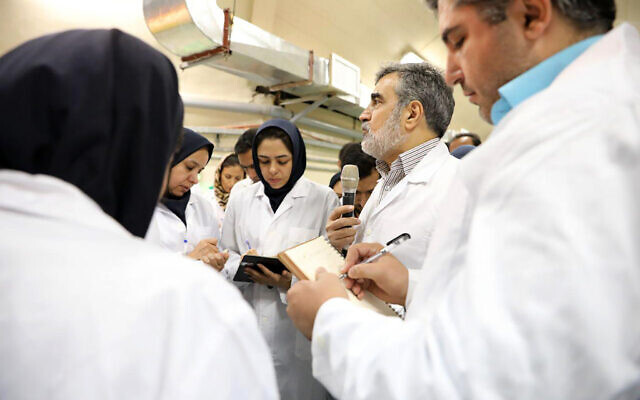
So yeah, I would tend to take seriously, the emergent reports. There was subsequent reporting by Israeli reporter Barak Ravid in Axios, and Ravid is somebody who has some very good sources, I think especially in the Israeli system. So there’s an accumulating body of evidence to suggest that something indeed may be going on.
Now certainly in terms of what Iran International and the other reports have said, what’s being talked about is what we used to call, or what’s being called a less-for-less deal. That is to say, rather than what the JCPOA was, a return to a kind of comprehensive deal for the long-term resolution of the Iranian nuclear issue. The sense would be okay, well we see, we can’t get to that, but let’s, instead of settling for nothing, let’s try and get something less than that. Let’s say we give less to the Iranians and the Iranians give less in return.
And what’s being talked about, at least in the reports, is the notion of very serious sanctions relief for the Iranians in return for their kind of freezing their current nuclear activity at its present level, where they do already have, as US officials have said, sufficient nuclear material such that it would take them just about another couple of weeks to have sufficient fissile material for making a nuclear weapon. So that’s the idea.
What are the details of what they’re going to get that’s been revealed so far? It’s been talked about that there is, if I remember correctly, $10 billion being held for them in Iraq and $7 billion held for them in South Korea, which is revenue and return for oil purchased outside of the sanctions program. And that $17 billion would become available to Iran in return for it freezing its nuclear activity at the current level.
That would be, from an Israeli point of view at least, very bad indeed. Because what it would mean, of course, would be that the Iranians would receive a very, very substantial reward for not very much at all, for just about agreeing to stay where they are. And where they are, at least in the estimation of people who I take very seriously, where they currently are is they are effectively a nuclear threshold state. So that’s not where Israel wants them to be. And Israel certainly doesn’t want to see them returning to international normalcy with that situation remaining in place.
But, yeah, I think the indications do seem to suggest that this is something we should take very, very seriously. And yeah, I’m sure that it’s credible to believe that the Biden administration would like to have a diplomatic achievement on the Iran file prior to 2024. So put all that together. Yeah, once again, I would say we should be looking very closely at this and it is a subject of some concern.
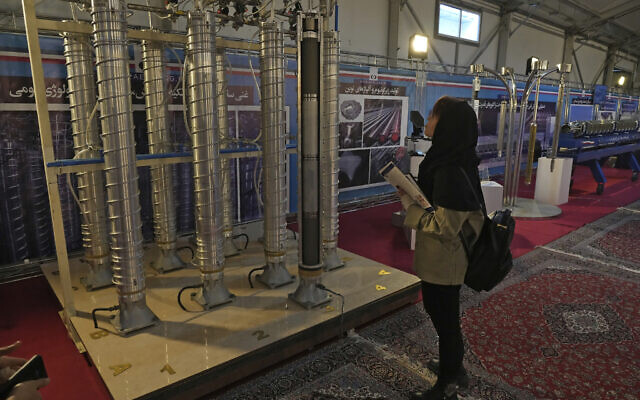
So we have this deal that’s not so great for Israel. We have Syria who’s being re-embraced. We have Iraq who’s flaring up as well. Correct? Tell us a little bit about Iraq.
Well, in Iraq, what you have is, you have an ongoing situation where the pro-Iranian militias, what’s called the Hashd al-Shabi, or Popular Mobilization Units, have a kind of freedom of action inside Iraq. In terms of my reporting over the years, I’ve also managed to spend some time with them as well during the ISIS war because the Iraqi Shia militias was something which I and other colleagues took very seriously right from the beginning. When we saw the mobilization of Iraqi Shia militias against ISIS in 2014, we realized, okay, this is going to be a problem. Because one thing which we know from the past, from Lebanon and other areas is it’s one thing to mobilize the Shia militias, and it’s a very different thing to demobilize them once the immediate threat has passed. The immediate threat can pass. The militias tend to stick around and then they become political and military tools for the Islamic Republic of Iran.
And that is precisely what has happened in Iraq. An attempt after the Iraqi elections to build a government excluding the pro-Iranian element — which was attempted between the movement of Muqtada al-Sadr and the Kurdish Democratic Party of Barzani and the Taqadum movement, which is a Sunni Arab movement — that attempt failed. And in the end, the government that has emerged in Iraq, under Prime Minister Muhammad Shia al-Sudani, is a government dominated by the Iran-associated element. This means that there is a situation today in which the Iranians are effectively, they’re not exclusively in control of Iraq, there are still other power centers, but they are today the most powerful single element in Iraq.
Let me give you an example. The acting National Security Adviser of the Iraqi Prime Minister today is a person who is closely associated with the Badr Organization, which is one of the most powerful and well-known Iran-supported militias, militia parties in the country. So the person taking key national security decisions is a person from an organization that answers directly to the Islamic Republic, the Islamic Revolutionary Guards Corps of the Iranian regime.
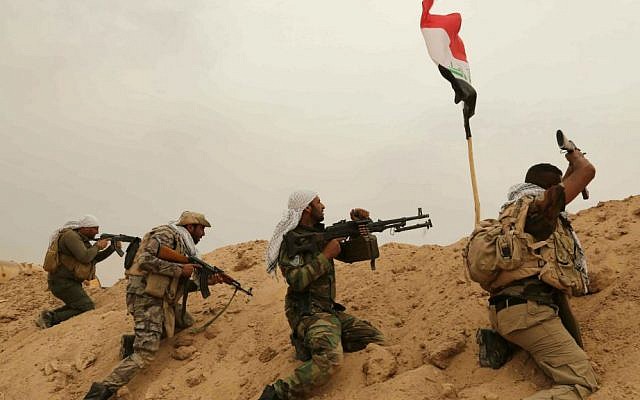
The Iranians are deep into Iraq. Now, according to a recent report in The Washington Post, the attacks in recent weeks and months on US personnel inside Syria — 900 US service people, of course, in eastern Syria today — were carried out from Iraq, by Iraq-supported Shia militias. So these are the people who are both the de facto governing authority of Iraq, and they are also engaged in a kind of low-scale but growing insurgency against the US presence both in Syria, and also in Iraq itself.
You are painting such a dire picture. I hope we can go out on a bit of a high. There are, of course, rumors all the time of Israel becoming normalized with Saudi Arabia. Rumors. We don’t know what’s happening, actually — and what are your thoughts on this?
First of all, I think we should have all due humility. That’s to say, I and others were sort of giving briefings, literally in weeks prior to the Abraham Accords, where we were saying Israel has a great de facto relationship with UAE, and it’s very likely that both Israel and the UAE will prefer to keep it de facto rather than de jure for the foreseeable future. And even while we were saying that, the final touches were being put on the formal diplomatic recognition between the two countries.
So, I think we should always keep a fair amount of humility in this. There’s lots that we don’t know, lots that we can’t know, for all that we do know, and we should always bear that in mind. The famous “unknown unknowns” of Donald Rumsfeld are always among us, and we shouldn’t forget that.
Having said that, I do think that there is, at least from what I gather on open source media, I do think there do appear to remain quite significant barriers to a formal recognition between Israel and Saudi Arabia at the present time. And the two things which we are reading about at least, are the Saudi desire for American approval for a civil nuclear program, in return for recognition, and perhaps less and perhaps less importantly, or at least less of a barrier, the Saudi desire for access to various advanced US weapons systems in return for an agreement of that kind.
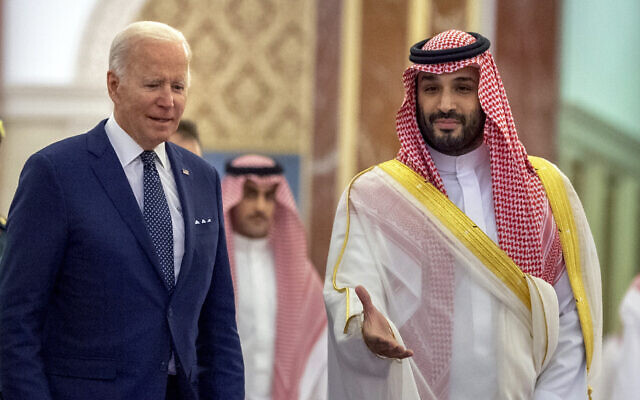
The weapons systems maybe could be finessed. Obviously for Israel what’s called the QME, or the “qualitative military edge” that it wishes to maintain is a very important strategic objective. But it’s possible that could be finessed, between allowing the Saudis access to certain of what they want, though not all of what they want, and seeing if we can meet somewhere in the middle.
With regard to the civil nuclear program, however, at least as far as I’m aware, there’s very, very serious Israeli objection to that. For I think, understandable or kind of fairly obvious reasons, Israel does not want to kind of help trigger a regional nuclear arms race by the beginnings of Saudi-approved civil nuclear power. It’s understandable why the Saudis wanted it well. Of course, this is not a question of sort of good against evil here, but it’s a kind of understandable context in which objectives and orientations are clashing.
Now it would seem to me, at least on the face of it, that will be quite a difficult barrier to get over. So we shall see. But I think we certainly shouldn’t rule anything out in this regard.
Jonathan, very soon we’ll have COP 28 in Dubai and at this meeting we could see Assad, we could see Netanyahu, we could see so many of the regional leaders together. How do you see this playing out?
Difficult to predict, but yeah, of course it is quite possible that — certainly Netanyahu has received his invitation, as we hear, and that Assad is probably quite likely to be there as well. It stands, I suppose, to be a demonstration of the kind of quite strange and emergent new regional picture that we’ve been discussing, and quite fluid regional picture that we’ve been discussing, in which the UAE simultaneously is a kind of a growing partner for Israel in all kinds of areas. And of course, we could talk about the burgeoning trade relationship since 2020, since we don’t want to always only be talking about gloomy and dire stuff. That’s something that has been a really notable success. And Netanyahu’s presence there is relevant to that, and especially given the fact that there has been concern coming out of UAE with regard to the complexion of the current Israeli government and as a result, a certain sense of a cooling in relations in recent months.
If Netanyahu goes to the conference, and that’s a sign that nevertheless, things are still intact, maybe even still moving forward. And parallel to that, if Assad is there, we have the strange situation in which at the same time as relations in UAE and Israel are growing and deepening and warming, there is also a parallel return to normalizing relations and reviving relations with the Syrian dictatorship, which is a key ally of the Iranians.
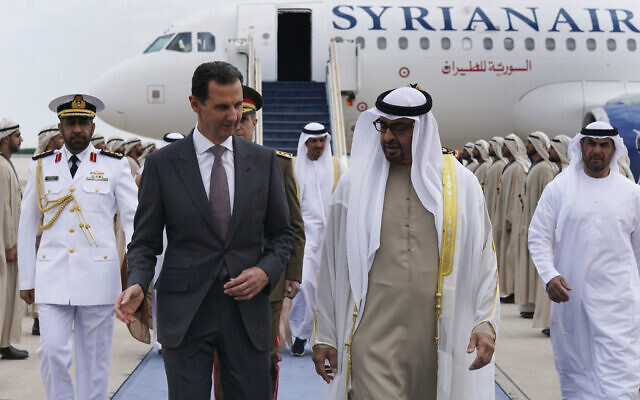
It’s worth remembering in this regard that the UAE was pioneering actually in the return of the normalizing of relations with Assad. And they reopened their embassy, if I remember correctly, as long ago as 2018. So they were very much ahead in that. And there’s a reason for that as well, which I think we always need to bear in mind when we talk about common strategic goals and perceptions between Israel and the Gulf Arabs.
Yes, there are common goals and perceptions, but the order of priorities has always been quite different. Israel, of course, places Iran and the Shia Islamist threat at absolutely number one, and the Iranian nuclear file as the top of the agenda, without any question. For the Emiratis, by contrast, there was always a little bit more of a focus on Sunni political Islam, on the Muslim Brotherhood and the Sunni Islamist threat because, of course, for them, in a certain way, that’s a maybe more tangible threat than the Iranians, or at least no less tangible.
So there was always a difference in that prioritizing. And from that point of view, the return of Syria to normal relations with UAE becomes a bit more comprehensible. Because, of course, from one point of view — I say this with hesitation as somebody who witnessed some of the worst acts of the Assad regime quite close up during the war — but from one point of view, Assad can be seen as somebody who faced a largely Sunni Islamist insurgency and managed to hold out against it. This certainly is the way that he’s seen in Cairo also, by the Egyptian government. And I think to a great extent the UAE, maybe share part of that perception. So that’s one of the reasons and explanations also for their willingness to sort of get out in front in normalizing with Assad. They just see the region not quite in the way we do. In a similar way, but not quite in the same way.
Jonathan, I thank you so much for allowing me to pick at the tangled web that this region weaves so easily, and I really appreciate your perspective.
Most welcome. And thanks again for inviting me, Amanda.
Pleasure.
What Matters Now podcasts are available for download on iTunes, TuneIn, Pocket Casts, Stitcher, PlayerFM or wherever you get your podcasts.
Check out last week’s What Matters Now episode:
There's no paywall on The Times of Israel, but the journalism we do is costly. As an independent news organization, we are in no way influenced by political or business interests. We rely on readers like you to support our fact-based coverage of Israel and the Jewish world. If you appreciate the integrity of this type of journalism, please join the ToI Community.

We’re really pleased that you’ve read X Times of Israel articles in the past month.
That’s why we started the Times of Israel eleven years ago - to provide discerning readers like you with must-read coverage of Israel and the Jewish world.
So now we have a request. Unlike other news outlets, we haven’t put up a paywall. But as the journalism we do is costly, we invite readers for whom The Times of Israel has become important to help support our work by joining The Times of Israel Community.
For as little as $6 a month you can help support our quality journalism while enjoying The Times of Israel AD-FREE, as well as accessing exclusive content available only to Times of Israel Community members.
Thank you,
David Horovitz, Founding Editor of The Times of Israel

